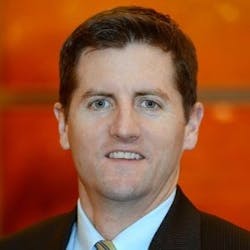Digital data is an artificial entity—a human construct to provide insight on real-world performance in the
same manner our notion of another construct, time, enables us to structure our daily lives. Likewise, augmented reality is phony—a digital ghost, an imagined version of the tactile, the analog.
Both are fakes. And fake ain’t always bad. Simulated-road modules allow our teenagers to practice driving before they actually get behind the wheel. I won’t turn down bacon bits at the salad bar. Hell, reality television is mostly fake.
And yet, both data and augmented reality are (increasingly) valuable to optimizing industrial efforts by bridging the gap between physical and digital worlds. This is very real. Data is the tool we use to monitor and benchmark. Augmented reality provides a virtual layer atop the real world in which we can, say, guide technicians performing complicated tasks.
What is critical with both concepts is accuracy. We must trust that the information fueling data analytics and augmented reality is reliable. Bad data leads to false insights, resulting in errant decisions that kill projects and revenue and jobs. (Bye-bye data scientist.) Screwy augmented reality can result in botched projects or real danger—consider the technician relying on his AR glasses when repairing a wind turbine in a storm.
So what’s the relationship between the two?
Data informs, fuels and enables augmented reality to exist. AR technology needs to know the specs of the real world in which it is being applied in order to offer an accurate augmented version of it.
One place to discover more about the interplay between the physical world and our digital models of it is at the upcoming Automation Fair event, November 14-15 at the Pennsylvania Convention Center in Philadelphia.
In particular, you’ll learn how industrial companies are leveraging Rockwell Automation technologies—and the company’s strategic partnership with AR-leader PTC—to increase productivity and plant efficiency, reduce operational risk and provide better system operability.
You gotta know what’s real before you can fake it.
That kinda sounds like a country-music song. A fake one.
Chris McNamara is content director with Smart Industry.
